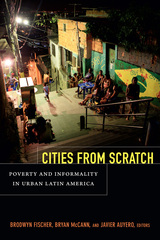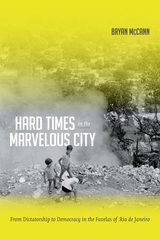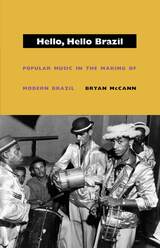3 books about McCann, Bryan

Cities From Scratch
Poverty and Informality in Urban Latin America
Brodwyn Fischer, Bryan McCann, Javier Auyero, eds.
Duke University Press, 2014
This collection of essays challenges long-entrenched ideas about the history, nature, and significance of the informal neighborhoods that house the vast majority of Latin America's urban poor. Until recently, scholars have mainly viewed these settlements through the prisms of crime and drug-related violence, modernization and development theories, populist or revolutionary politics, or debates about the cultures of poverty. Yet shantytowns have proven both more durable and more multifaceted than any of these perspectives foresaw. Far from being accidental offshoots of more dynamic economic and political developments, they are now a permanent and integral part of Latin America's urban societies, critical to struggles over democratization, economic transformation, identity politics, and the drug and arms trades. Integrating historical, cultural, and social scientific methodologies, this collection brings together recent research from across Latin America, from the informal neighborhoods of Rio de Janeiro and Mexico City, Managua and Buenos Aires. Amid alarmist exposés, Cities from Scratch intervenes by considering Latin American shantytowns at a new level of interdisciplinary complexity.
Contributors. Javier Auyero, Mariana Cavalcanti, Ratão Diniz, Emilio Duhau, Sujatha Fernandes, Brodwyn Fischer, Bryan McCann, Edward Murphy, Dennis Rodgers
Contributors. Javier Auyero, Mariana Cavalcanti, Ratão Diniz, Emilio Duhau, Sujatha Fernandes, Brodwyn Fischer, Bryan McCann, Edward Murphy, Dennis Rodgers
[more]

Hard Times in the Marvelous City
From Dictatorship to Democracy in the Favelas of Rio de Janeiro
Bryan McCann
Duke University Press, 2013
Beginning in the late 1970s, activists from the favelas of Rio de Janeiro challenged the conditions—such as limited access to security, sanitation, public education, and formal employment—that separated favela residents from Rio's other citizens. The activists built a movement that helped to push the nation toward redemocratization. They joined with political allies in an effort to institute an ambitious slate of municipal reforms. Those measures ultimately fell short of aspirations, and soon the reformers were struggling to hold together a fraying coalition. Rio was bankrupted by natural disasters and hyperinflation and ravaged by drug wars. Well-armed drug traffickers had become the new lords of the favelas, protecting their turf through violence and patronage. By the early 1990s, the promise of the favela residents' mobilization of the late 1970s and early 1980s seemed out of reach. Yet the aspirations that fueled that mobilization have endured, and its legacy continues to shape favela politics in Rio de Janeiro.
[more]

Hello, Hello Brazil
Popular Music in the Making of Modern Brazil
Bryan McCann
Duke University Press, 2004
“Hello, hello Brazil” was the standard greeting Brazilian radio announcers of the 1930s used to welcome their audience into an expanding cultural marketplace. New genres like samba and repackaged older ones like choro served as the currency in this marketplace, minted in the capital in Rio de Janeiro and circulated nationally by the burgeoning recording and broadcasting industries. Bryan McCann chronicles the flourishing of Brazilian popular music between the 1920s and the 1950s. Through analysis of the competing projects of composers, producers, bureaucrats, and fans, he shows that Brazilians alternately envisioned popular music as the foundation for a unified national culture and used it as a tool to probe racial and regional divisions.
McCann explores the links between the growth of the culture industry, rapid industrialization, and the rise and fall of Getúlio Vargas’s Estado Novo dictatorship. He argues that these processes opened a window of opportunity for the creation of enduring cultural patterns and demonstrates that the understandings of popular music cemented in the mid–twentieth century continue to structure Brazilian cultural life in the early twenty-first.
[more]
READERS
Browse our collection.
PUBLISHERS
See BiblioVault's publisher services.
STUDENT SERVICES
Files for college accessibility offices.
UChicago Accessibility Resources
home | accessibility | search | about | contact us
BiblioVault ® 2001 - 2024
The University of Chicago Press









